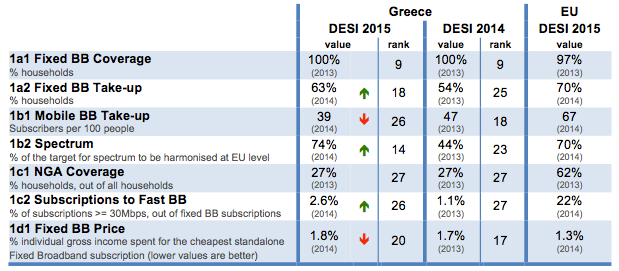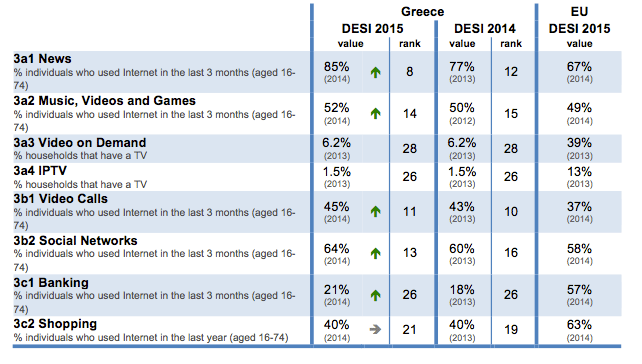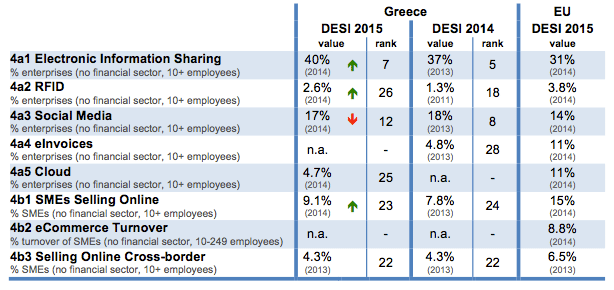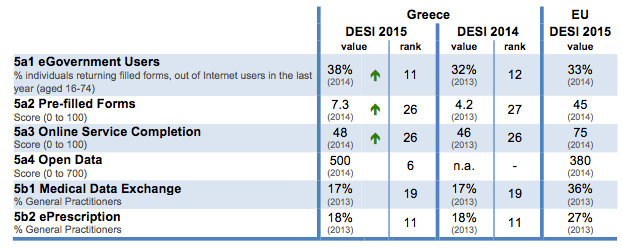


Greece has an overall score of 0.36 and ranks 26th out of the 28 EU Member States. Relative to last year, Greece has progressed in terms of Connectivity; but despite 100% of Greek households being covered by fixed broadband, 37% do not yet subscribe to it. Greece lags behind on the demand side, with low levels of digital skills (only 59% are regular Internet users, while 33% have never used the Internet) and trust (most Greeks still don't shop online or do online transactions). These seem to be holding back the development of its digital economy. Online public services are a key challenge for Greece, as it is among the last in the EU; it is positive to note, however, that 38% of Internet users have exchanged filled forms with the public administration online.
Greece falls into the cluster of low-performance countries, where it performs below average.

In the DESI 2015, the low-performance cluster of countries comprises Bulgaria, Cyprus, Greece, Croatia, Hungary, Italy, Poland, Romania, Slovenia and Slovakia.
In terms of connectivity Greece has improved significantly compared to the previous year but it still performs worse than most of other EU countries.

With an overall Connectivity score of 0.41 the country ranks 26th among EU countries. Despite the fact that 100% of Greek households are covered by fixed broadband 37% of them do not yet subscribe to it. Moreover, Next Generation Access capable of providing high speed Internet (at least 30 Mbps download) is available to only 27% of homes, far below the EU average of 62%.

Greece has two main challenges in Connectivity. First, it needs to increase the number of broadband subscribers, as only 63% of households subscribe to fixed broadband and 39% of citizens to mobile broadband, limiting Greece's ability to exploit the benefits of the digital economy. Second, it needs to improve coverage of fast networks, i.e. Next-generation Access (NGA) networks providing at least 30 Mbps.
To date NGA coverage in Greece is less than half of the average EU level. Likewise, subscriptions to fast broadband need to be improved since only 2.6% of fixed Internet subscriptions are to high-speed connections (22% in the EU).
One of the reasons explaining the low broadband take-up might be affordability, since the standalone fixed broadband subscription in Greece costs as much as 1.8% of the average gross income per capita (1.3% in the EU)5. Low take-up could also be attributed to the relatively low demand resulting from a lack of digital skills in the general population.
Calculations performed taking into account the price of the least expensive standalone fixed broadband connection offering speeds between 12 Mbps and 30 Mbps.
With a Human Capital score of 0.36, Greece ranks 26th among EU countries, showing only mild improvement compared to the previous year (0.33).

In order to fully develop its digital economy and society, Greece needs to engage its citizens to use the Internet. Greece has one of the lowest levels of regular Internet users in the EU (59%), and 33% of the Greek population has never used the Internet (the EU average is 18%). This means that one-third of the population cannot partake on the possibilities offered by the Internet, nor can they contribute to the digital economy.

Greece needs to address its severe digital skills gap, as insufficient levels of digital skills limit the exploitation of benefits for investments in digital technologies as well as gains for citizens for engaging in a wide range of on-line activities. Digital skills are nowadays needed in every corner of the workforce, and the fact that only 45% of Greeks possess at least basic levels of digital skills can be an important barrier to the country’s economic development. Finally, Greece has the second lowest share of ICT specialists6 in the workforce among all EU countries (1.4%).
Broad definition taken from JRC (IPTS) "The evolution of EU ICT employment 2000-2012" Technical report (forthcoming): ISCO codes 25 and 35, plus ICT graduates in certain adjacent ISCO codes.
Greece also performs worse than the EU average in terms of STEM (science, technology, engineering and mathematics) graduates, with 1.4% of Greeks aged 20-29 years old holding a STEM degree. As a result there is a digital skills deficit, which impedes the potential of the digital economy for growth and jobs.
In terms of the propensity of individuals to use Internet services, Greece scores 0.33 (up from 0.30 last year) and ranks 26th among EU countries. Greeks appear to refrain most from using the Internet when they need to make transactions, as Greece lags behind both in online banking and online shopping.

Greek Internet users engage in a broad range of online activities. They read news online (85%), listen to music, watch films and play games online (52%), and use the Internet to communicate via voice or video calls (45%) or through social networks (64%). For all of these activities, engagement among Greeks is higher than overall in the EU.

While Greeks are keen to engage in the above Internet activities, they are very reluctant to engage in any type of online transaction, possibly because of lack of trust. The shares of Greek Internet users that use online banking (21%) or shop online (40%) are much lower than the EU average (57% and 63%, respectively). This is the key challenge for Greece in terms of Internet use by its citizens, because a digital economy is partly fuelled by its citizens’ consumption in the online channel.
Integration of Digital Technology by businesses is the DESI 2015 dimension where Greece performs best compared to all other dimensions since it scores 0.31 and ranks 19th among the EU countries. Still, Greece's businesses need to better exploit the possibilities offered by on-line commerce and cloud-based applications.

Η πραγματική ψηφιακή οικονομία είναι εκείνη όπου οι επιχειρήσεις αξιοποιούν πλήρως τις δυνατότητες και τα οφέλη που προσφέρουν οι ψηφιακές τεχνολογίες για να βελτιώσουν την αποτελεσματικότητα και την παραγωγικότητά τους, καθώς και για να προσεγγίσουν πελάτες και να πραγματοποιήσουν πωλήσεις. Ως προς αυτή την παράμετρο, η Ελλάδα έχει μέτριες επιδόσεις και είναι αναγκαίο να γίνουν ορισμένες βελτιώσεις.

A true digital economy is one where businesses take full advantage of the possibilities and benefits offered by digital technologies, in order to improve their efficiency and productivity, as well as to reach costumers and realise sales. To that end, Greece is a moderate performer and certain improvements are necessary.
The adoption of digital technologies is an important driver of labour productivity growth and needs to be strengthened. The percentage of businesses using technologies such as electronic information sharing (ERP – 40%) and social media (17%) is above the EU average (31% and 14%, respectively). However, not many Greek businesses use RFID (2.6%), eInvoices (4.8% in 2014), or cloud services (4.7%). Greek businesses need to improve their digitization in order to attain further efficiency and productivity gains.
Greek businesses need also to take advantage of the possibilities offered by on-line commerce. Very few SMEs in Greece sell online (9.1%) and even less sell online to other EU member states (4.3%).
Digital Public Services is the dimension where Greece has improved the most compared to the previous year. With a score of 0.35, Greece climbed the ranking from 27th last year to 21st this year. However, Greece performs worse than the EU average in most of the digital public services indicators.

Modern public services offered online in an efficient manner are a vehicle for efficiency gains for enterprises, citizens, and the public administration itself. Greece faces a key challenge in online public services. Its indicator scores7 place it among the last in the EU and show that the level of sophistication of its services needs to improve significantly. Despite this, Greece manages to score above the EU in the percentage of Internet users that have exchanged filled forms with the public administration online (38%).

The efficiency and degree of service offered by health systems can be greatly improved through digitisation. Greece’s performance in eHealth can be improved, namely by encouraging a greater adoption of medical data exchange (only 17% of Greek general practitioners exchange medical data electronically, versus 36% in the EU). In addition, Greece needs to increase its performance in relation to ePrescription, where only 18% of its general practitioners transfer prescriptions to pharmacists electronically.